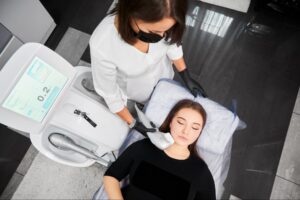
Treating Melasma with Ultra Laser: A Safe and Effective Solution
Melasma is a common skin condition that presents as dark, uneven patches on the skin, typically on the face. Managing melasma can be challenging, especially since many treatments can irritate the skin or make the condition worse. The Ultra Laser offers a targeted and effective solution to reduce melasma’s pigmentation safely, while minimizing the risk of aggravating the skin.
What is Melasma?
Understanding Melasma
Melasma is a pigmentation disorder that causes brown or gray patches, most often on the cheeks, forehead, and upper lip. It is typically triggered by sun exposure, hormonal changes—such as pregnancy or birth control use—and genetics. Treating melasma is challenging because it is often recurrent and can be aggravated by aggressive treatments.
Why Melasma Requires a Gentle Approach
Many treatments can irritate the skin or worsen melasma. That’s why it’s important to use targeted treatments like UltraClear Laser. UltraClear can be adjusted to specifically target pigmentation without triggering inflammation or further damaging the skin.
How UltraClear Laser Treats Melasma
Targeting Pigmentation with Precision
UltraClear Laser uses fractional laser energy to break down melanin (the pigment responsible for melasma) without affecting the surrounding tissue. The treatment can be customized to penetrate different layers of the skin depending on the depth of pigmentation, ensuring a precise approach for optimal results. While UltraClear is an ablative laser, it can be titrated to treat melasma at a very superficial setting, allowing for effective results with minimal disruption to the skin.
Adjustable Ablative Treatment
Unlike other ablative lasers that are more aggressive, UltraClear can be set to a superficial level to treat melasma effectively. This allows for a gentler approach that maintains the integrity of the skin’s surface, which is crucial for patients with sensitive or reactive skin.
Benefits of UltraClear for Melasma
Safe for All Skin Types
UltraClear is an effective option for a wide range of skin tones, which is particularly important for melasma patients. Those with darker skin tones are more prone to hyperpigmentation from traditional laser treatments, but UltraClear’s adjustable settings make it a safer alternative.
Reduces Risk of Melasma Recurrence
UltraClear not only reduces pigmentation but also stimulates collagen production, helping to improve skin texture and resilience. Over time, this can lead to fewer flare-ups and a more even skin tone.
Gentle on Sensitive Skin
Because UltraClear can be set to a superficial level, it minimizes the risk of irritation or worsening melasma. This makes it an excellent choice for those who have struggled with more aggressive treatments in the past.
What to Expect from UltraClear Laser Treatment at Nuveau
Personalized Treatment Plans
At Nuveau, we create a customized treatment plan tailored to your unique skin needs. During your consultation, our team will assess the severity of your melasma and adjust the UltraClear settings to ensure you get the best possible results for your skin.
Quick Procedure and Recovery
UltraClear treatments are typically quick and involve minimal discomfort. After the session, a simple skincare regimen will help protect the skin and maintain results. Sun protection is critical to prevent new pigmentation, as sun exposure is a primary trigger for melasma.
Conclusion: A Safe and Effective Treatment for Melasma
UltraClear Laser is a safe and highly effective treatment for melasma that helps minimize pigmentation without the harsh side effects of more aggressive options. If you’re ready to explore how UltraClear can help with your melasma, schedule a consultation with the experts at Nuveau today.
Book your appointment and take the first step toward achieving a more even, radiant complexion.

